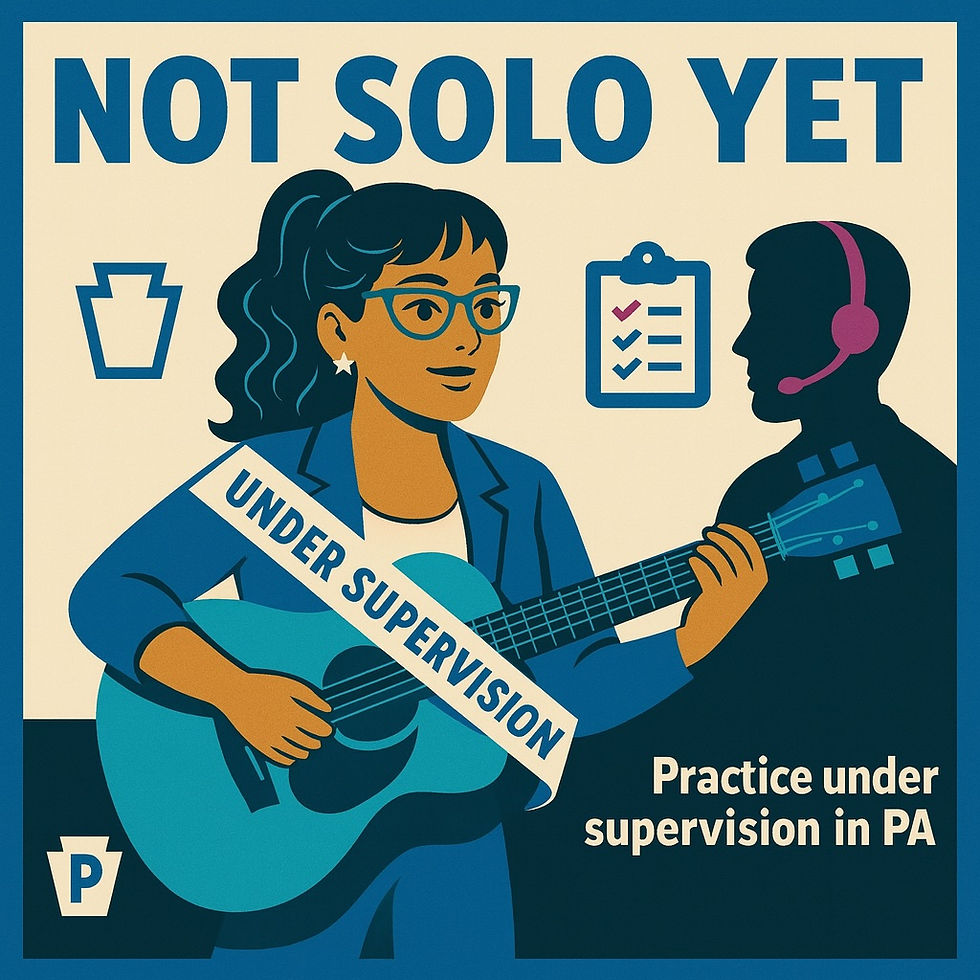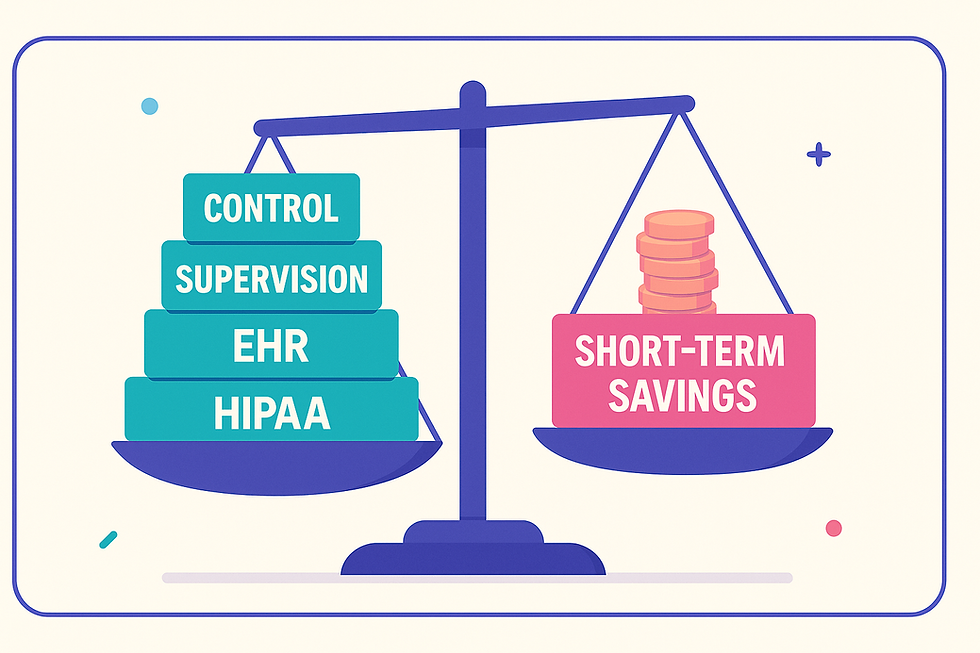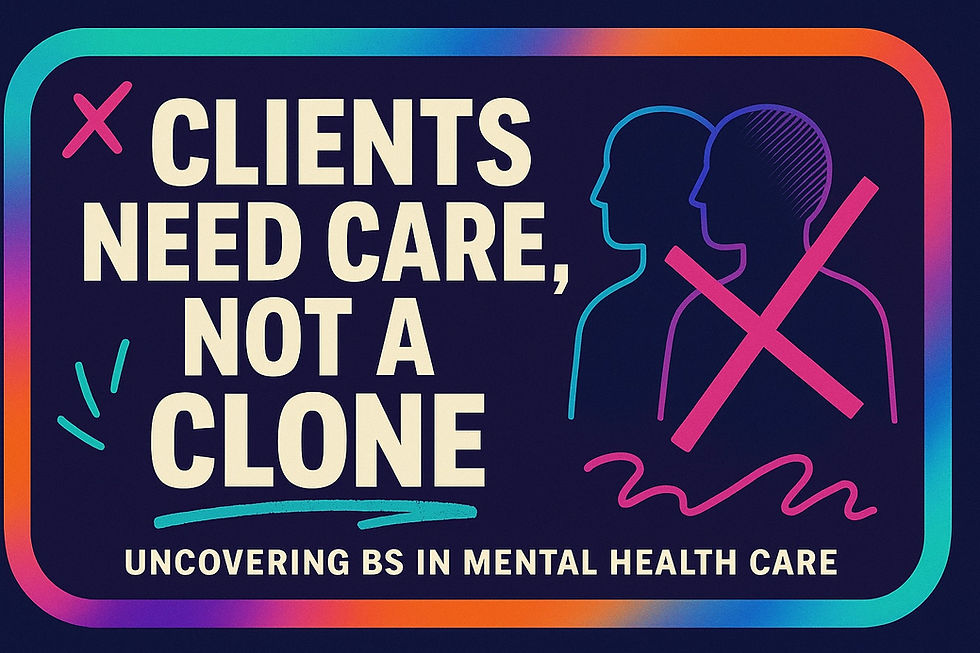Associates, You’re Not a Solo Act (Yet)
- Cindy Pilcher, MS, LPC, NCC

- Sep 10, 2025
- 3 min read

Picture this: you’ve got the talent, the playlists, the mic—everything for a killer set. But if you’re associate-licensed in Pennsylvania, you’re not yet headlining the arena. By law, you’re playing with a bandleader. That’s not shade; it’s the scaffolding that keeps clients safe, your license path clean, and your future earnings intact.
What the Law Actually Says (without the legalese headache)
Pennsylvania’s statute is blunt: you can’t advertise or engage in the independent practice of professional counseling, MFT, or clinical social work unless you hold the full license (LPC/LMFT/LCSW). In other words, no solo shingle, no “my private practice,” no flying without a qualified supervisor responsible for oversight. That’s written right into Act 76. Pennsylvania General Assembly
And the State spells out what “independent practice” means: styling yourself as the professional (not “under supervision”), taking responsibility for your own procedures, and operating outside an affiliated entity. If you’re running the brand, setting fees, and controlling records as you, you’ve wandered into the “nope” zone. The Board’s own FAQ lays out that definition—clearly. Pennsylvania Government
“But I’m an Associate—Isn’t That a License?”
Yes, and it’s a supervised one. Pennsylvania created associate pathways (like LAMFT and LAPC) to expand access—with accountability. Associates can work, learn, and often bill, but only inside a bona fide supervisory structure, with a supervision plan on file that names employers, locations, duties, and the supervisor’s credentials.
Translation: you’re licensed to practice, not to practice independently. Pennsylvania Government+1
Why the Guardrails Exist (and why they’re good for you)
Supervision isn’t a bureaucratic hoop; it’s the professional exoskeleton that lets you take on complex work while someone more seasoned has line-of-sight on risk and judgment calls. The regulations even quantify it: Pennsylvania expects two hours of supervision for every forty hours of supervised clinical experience—and much of it from specifically qualified supervisors. That ratio isn’t random; it’s there because real lives are involved. Pennsylvania Code & Bulletin
The Branding Trap
If your biography suggests a solo practice, your website doesn't mention your supervising practice, your invoices are issued by “You, LLC,” and your consent forms list only you as the record custodian, the law interprets this as independence—even if you describe it as “collaboration.” Titles matter. Affiliation matters. Custody of records matters. The Board has been explicit that Act 76 bars independence without the full license; there isn’t a clever workaround in brand strategy. Pennsylvania GovernmentPennsylvania General Assembly
Interruption Isn’t Optional—It’s Ethical and Required
Here’s the part people forget until it hurts: interruption of services. If care might be disrupted—because you’re ill, you leave a job, your supervisor is away—Pennsylvania’s rules require you to notify clients and provide a referral for continued services. That’s not a “nice to have”; it’s embedded in the Board’s “responsibilities to clients.” The idea is simple: no client should be abandoned because life happened behind the scenes. Have coverage, communicate clearly, and make sure your supervision and practice structures support continuity. Legal Information Institute
What This Looks Like in Real Life
Think of associate practice as residency with more comfortable shoes. You’re doing the work—intakes, treatment planning, the hard conversations—while your supervisor ensures the practice is safe, ethically sound, and legally compliant. Your online presence shows your status. Your paperwork names the supervising practice and supervisor. Your billing trails match the affiliation. And if there’s a sudden left turn (you move clinics, your supervisor goes on leave, you need time off), clients get a timely notice and a warm handoff instead of a cold stop. That’s not just good optics; it’s the rule. Pennsylvania Government Legal Information Institute
The Upside of Playing with a Bandleader
It’s easier to grow fast when you’re not also juggling malpractice exposure, payer audits, record custody, and every gnarly decision alone. Supervision turns pressure into progress: your most challenging cases become case consultations; your near-misses become professional muscle memory. Meanwhile, your hours are accruing under the right conditions, so the licensure board doesn’t bounce your application later for technicalities. (Yes, that happens. The supervision rules are specific on who can supervise and how often.) Pennsylvania Code & Bulletin
The Bottom Line
If you’re associate-licensed in Pennsylvania, you’re licensed with scaffolding. You can practice. You can make an impact. You can get paid. You can’t go independent—yet. The path to a full license is designed to protect clients and protect you. Honor the structure, keep interruption plans real, and you’ll cross the finish line with your reputation—and your paperwork—exactly where you want them. Pennsylvania General Assembly Pennsylvania Government+1 Legal Information Institute
Educational, not legal advice. For specifics, check the PA State Board pages or consult counsel.



It’s a shame that some people in the industry could care less about ethics. And clients are the ones that suffer at the hands of “the money makers “. The ones that throw ethics out the window care more about volume than the person they’re caring for….ChaChing🤦🏼♀️! How refreshing that someone can’t site ethics and actually practice ethically!